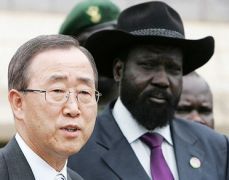UN chief welcomes end of Sudan peace crisis
February 4, 2008 (UNITED NATIONS) — U.N. Secretary-General Ban Ki-moon on Monday welcomed the end to a three-month political crisis that threatened to re-ignite Sudan’s north-south civil war and urged both sides to implement their peace deal, calling it essential to lasting stability in the country and the region.
 In a report to the U.N. Security Council, Ban warned that although Sudan’s government of national unity has been restored, “its resilience will depend on its ability to ensure sustained implementation” of the Comprehensive Peace Agreement that ended the 21-year civil war in 2005.
In a report to the U.N. Security Council, Ban warned that although Sudan’s government of national unity has been restored, “its resilience will depend on its ability to ensure sustained implementation” of the Comprehensive Peace Agreement that ended the 21-year civil war in 2005.
He said “major challenges” need to be addressed in the weeks and months ahead, including redeploying forces, forming joint military units, marking the north- south boundary, and resolving the crucial issue of who should control the contested oil-rich Abyei region. The two sides also need to move forward with a census which is essential to prepare for elections which must take place in 2009, he said.
“Full implementation of the Comprehensive Peace Agreement is in the interests of both parties and is fundamental to lasting peace and stability in the Sudan and the region,” Ban said.
The agreement ended a conflict that left an estimated 2 million people dead and created a unity government led by President Omar al-Bashir and his one-time military rival First Vice President Salva Kiir. But Kiir walked out of the government in October.
The Sudanese People’s Liberation Movement, which Kiir heads, accused al-Bashir of multiple breaches of the 2005 peace deal – including not sharing the country’s oil wealth as agreed, not pulling troops out of southern Sudan, and remilitarizing contested border zones where the main oil reserves are located.
The movement returned to the government in December after al-Bashir and Kiir agreed on a timetable for the redeployment of their forces and the deployment of joint units in the sensitive oil field areas though the control of Abyei region remains unresolved.
Ban told the council the timetable for redeploying forces hasn’t been met.
Since there is still no defined north-south border, he said “it is extremely important to complete the redeployment…to uncontested and mutually agreed areas.”
The secretary-general urged the parties to start marking the border as soon as possible, saying this would “kick-start” action on the census, elections and power- and wealth-sharing arrangements.
As for Abyei, Ban said he is “extremely concerned” about recent clashes between the Sudanese People’s Liberation Army and local tribes in the area. He called for a two-pronged approach to tackle the dispute – stabilizing the situation on the ground and getting the national leaders to resolve the issue through political dialogue.
On Oct. 30, the Security Council voted unanimously to extend the mandate of the 18,800-strong U.N. force monitoring the north-south peace agreement. Ban told the council he would recommend changes to the force’s mandate in his next report in April.
While the report focused on the north-south accord, Ban stressed that “peace in the Sudan is indivisible.”
“If the Comprehensive Peace Agreement fails, that will have severe repercussions for the entire country, including efforts to end the conflict in Darfur,” he warned.
(AP)
